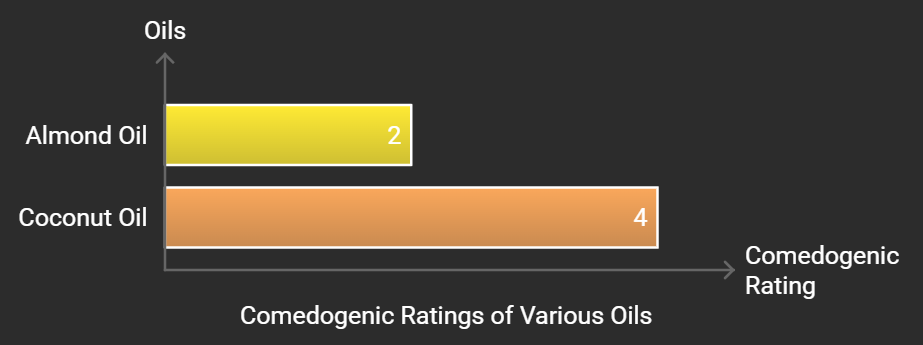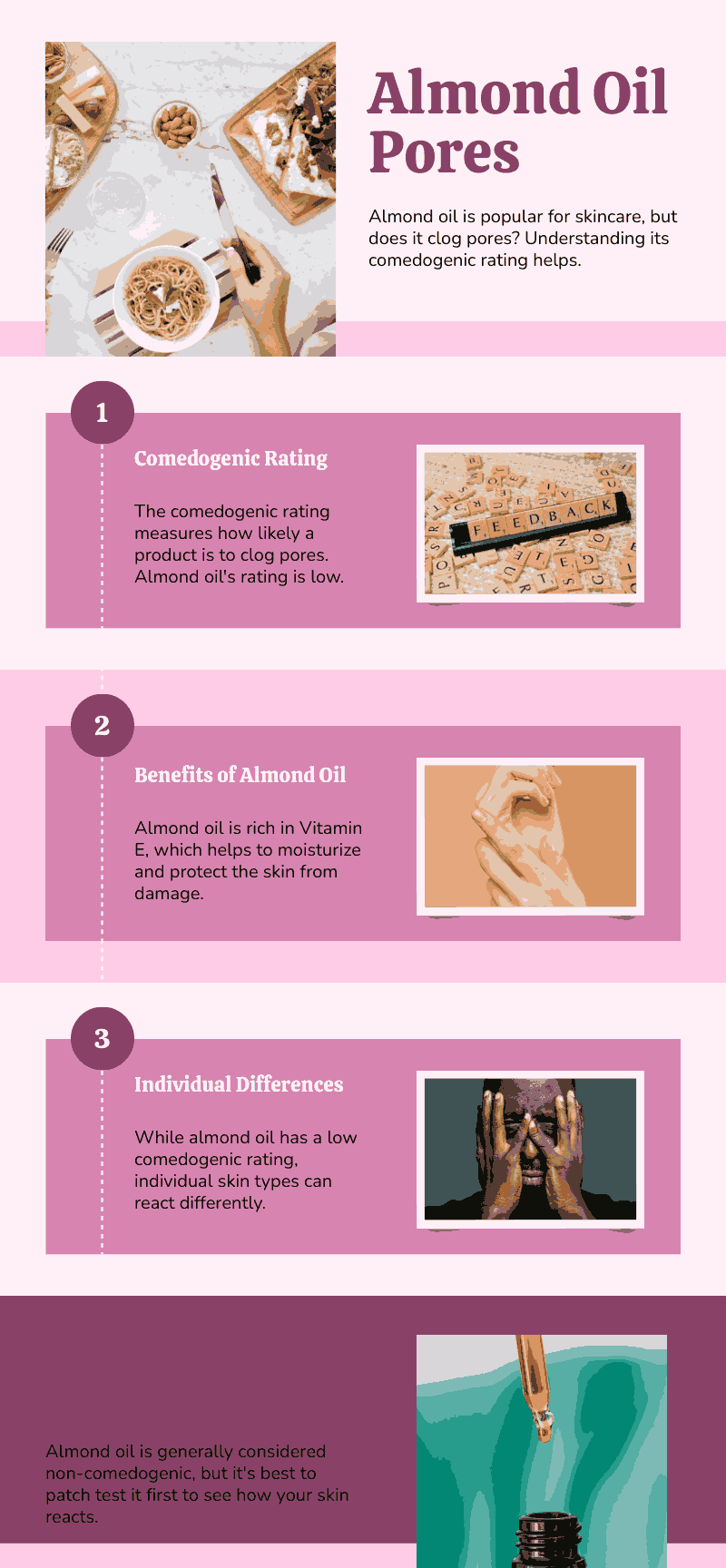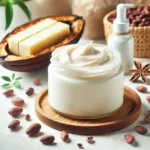- Almond oil has a comedogenic rating of 2, which means it has moderate potential to clog pores
- Patch testing is essential if you’re uncertain whether almond oil will work for your skin type.
- Consider natural alternatives like jojoba oil, grapeseed oil, and hemp seed oil if you’re looking for a non-comedogenic option.

In today’s natural skincare movement, almond oil often gets a reputation as a gentle, nourishing ingredient. But there’s one crucial question that continues to pop up: Does almond oil clog pores, and can it lead to breakouts? In this comprehensive blog, we explore whether almond oil lives up to the hype or if it might be a hidden culprit behind acne and congested skin.
The Science Behind Almond Oil’s Comedogenic Rating
Understanding whether almond oil will clog your pores starts with exploring its comedogenic rating. The comedogenicity scale ranges from 0 to 5, ranking oils and ingredients based on their likelihood to clog pores. A score of 0 means non-comedogenic, and a score of 5 signifies high clogging potential.
Almond oil is rated at 2 on this scale. This rating classifies it as moderately comedogenic, meaning it has the potential to clog pores, though it’s not as risky as highly comedogenic oils like coconut oil (rated 4). For people with dry or normal skin, this might not be a major concern, but those with oily or acne-prone skin need to be cautious.
So, what does this mean for your skincare routine? Should you be using almond oil, or is it better to steer clear?
Cocoa Butter & Acne: The Truth Behind the Debate
Almond Oil: A Double-Edged Sword in Skincare?
Almond oil is rich in vitamins like A, E, and fatty acids, all of which are beneficial for moisturizing the skin. Its emollient properties make it a favorite among people with dry or sensitive skin, offering hydration without an overwhelming greasy texture.
For dry skin, almond oil can lock in moisture and restore softness, which is why it’s a go-to ingredient in many creams and lotions. For those who suffer from flaky or irritated skin, it can soothe discomfort and keep the skin barrier intact.
But there’s a flip side. Its comedogenic rating of 2 means that while it may work wonders for some, it may also clog pores in individuals with oily or acne-prone skin. So, if you’re already struggling with blemishes, almond oil could exacerbate the issue by trapping excess oil and bacteria in your pores, leading to more breakouts.

What the Experts Say: Dermatologists Weigh In
Dermatologists are divided when it comes to almond oil’s benefits and risks. Dr. Shereene Idriss, a board-certified dermatologist, generally supports almond oil, especially for those with dry skin:
“Almond oil is considered non-comedogenic, meaning it won’t clog your pores,” she says. “It locks in moisture without leading to congestion, making it an attractive option for most skin types.”
But not every dermatologist shares the same enthusiasm. Dr. Joshua Zeichner, another prominent dermatologist, offers a more cautious perspective:
“Sweet almond oil is a great moisturizer for dry skin types, but I would recommend caution for those with oily or acne-prone skin due to its moderate comedogenicity rating.”
His viewpoint highlights the crucial factor of individual skin type. While almond oil can be an effective moisturizer for dry skin, those with oily skin may need to proceed with caution, especially if they are prone to acne.
Real-World Feedback: What Users Are Saying
While scientific studies provide a theoretical basis, real-world experiences with almond oil offer further insight. Across forums like Reddit, beauty blogs, and YouTube, the feedback is mixed, with users divided over its benefits.
One Reddit user in the SkincareAddiction community shared, “I loved how moisturizing almond oil was, but I started breaking out after a few days of using it.” Many others echoed this sentiment, explaining that while almond oil felt great on their skin initially, it led to an increase in blackheads and breakouts over time.
On the flip side, users with dry skin often have a more positive experience. “Almond oil is an excellent moisturizer for people with dry skin,” noted a commenter on the SkinKraft blog. “This oil has a comedogenic rating of 2, so it works for me but might not suit everyone.”
YouTube vloggers frequently offer similar feedback. In one skincare video, a vlogger detailed their experience: “Almond oil was super hydrating and made my skin glow, but unfortunately, it led to breakouts after about a week.”
This contrast in experiences highlights the importance of skin type in determining whether almond oil will work for you.
What About Sensitive Skin?
Sensitive skin, characterized by a tendency to react to many products, often requires special care. Almond oil, known for being gentle and soothing, is frequently recommended for those dealing with conditions like eczema or psoriasis. However, if your sensitive skin is also prone to oiliness or breakouts, almond oil may still pose a risk.
In general, almond oil is non-irritating and non-sensitizing for most people. If you’re unsure, the safest approach is to patch test the oil on a small section of your skin before fully integrating it into your routine.
Why Skin Type Matters: Is Almond Oil Right for You?
The effectiveness of almond oil really depends on your skin type. Here’s a breakdown of who might benefit and who should proceed with caution:
- Dry or Dehydrated Skin: Almond oil works wonders for this skin type. Its rich, emollient texture provides deep hydration, locking in moisture for extended periods.
- Normal Skin: If your skin is balanced (not too oily or dry), almond oil can help maintain this equilibrium while offering a smooth, radiant complexion.
- Oily or Acne-Prone Skin: This is where things get tricky. Given almond oil’s moderate comedogenic rating, people with oily skin or who are prone to breakouts should be careful. While the oil can provide moisture, it could also clog pores and lead to an increase in acne.
If you’re unsure whether almond oil is right for you, the best approach is to patch test or consult a dermatologist.
Natural Alternatives to Almond Oil
If you’re worried about almond oil clogging your pores, you’re not out of options. There are several other oils with similar moisturizing benefits that have lower comedogenic ratings and are less likely to cause breakouts.
Jojoba Oil
Jojoba oil is an excellent alternative to almond oil for those with oily or acne-prone skin. With a comedogenic rating of 2, jojoba oil mimics the skin’s natural sebum, balancing oil production. It’s lightweight, absorbs quickly, and is less likely to clog pores than other oils.
Grapeseed Oil
Grapeseed oil has a comedogenic rating of 1, making it less likely to clog pores. It’s rich in antioxidants and can improve skin elasticity while offering hydration without greasiness.
Rosehip Oil
Rosehip oil is packed with essential fatty acids and vitamin A, which help improve skin texture and tone. It’s especially beneficial for people dealing with hyperpigmentation or acne scars. With a comedogenic rating of 1, it’s a great option for acne-prone skin.
Hemp Seed Oil
Hemp seed oil is one of the most non-comedogenic oils available, with a rating of 0. It’s a great option for people with oily skin as it doesn’t clog pores and offers soothing anti-inflammatory benefits.
Argan Oil
Argan oil has a comedogenic rating of 0, making it a universal favorite across all skin types. It’s high in vitamin E and fatty acids, making it perfect for moisturizing without the risk of breakouts.
Does Almond Oil Clog Pores? The Final Verdict
Ultimately, whether almond oil will clog your pores depends on your skin type and how you use it. For those with dry or sensitive skin, almond oil can provide much-needed hydration, locking in moisture and soothing irritation. For individuals with oily or acne-prone skin, almond oil’s moderate comedogenic rating of 2 means it could potentially cause breakouts, especially if used in large amounts or applied without proper cleansing.
Both dermatologists and real users agree on one thing: almond oil isn’t a one-size-fits-all solution. While it can work beautifully for some, it’s not the best choice for everyone, especially those with blemish-prone skin. If you have oily or acne-prone skin and are still considering almond oil, patch testing and consulting a skincare professional are recommended before adding it to your routine.

I’m a devoted organic skincare enthusiast, passionate about the natural, wholesome goodness that organic products bring to our skin.
Organic skincare isn’t just a hobby for me—it’s a lifestyle. Every product I use, recommend, and write about has been carefully chosen for its purity and effectiveness. Everything I write about is backed by scientific studies, dermatologists’ opinions, and user experiences.
I also excel at tackling skincare challenges with innovative, organic solutions.


